Analyzing Key Aspects of the Islamic Worldview: CS315 Assignment
VerifiedAdded on 2023/06/11
|10
|2851
|459
Essay
AI Summary
This essay provides an in-depth analysis of the Islamic worldview, focusing on its theological foundations and sociological implications. It begins with an introduction to worldviews, defining them as comprehensive sets of beliefs that shape perceptions and actions. The essay then delves into Islamic theology, emphasizing the central belief in Allah as the one and only God, the importance of the Quran and Sunnah, and the concept of unitarian theism. It explores the Islamic views on prophets, angels, and the rejection of any claims of new revelations after Prophet Muhammad. The essay further examines the sociological aspects of the Islamic worldview, including the creation of mankind, the equality of all people before God, and the differing views on gender roles. A personal reflection is included, discussing how the author, a Christian minister, interacts with people of different worldviews and advocates for equal treatment and understanding. The essay concludes by critiquing the Islamic worldview's stance on religious tolerance and gender discrimination, arguing that it does not have a place in the 21st century.
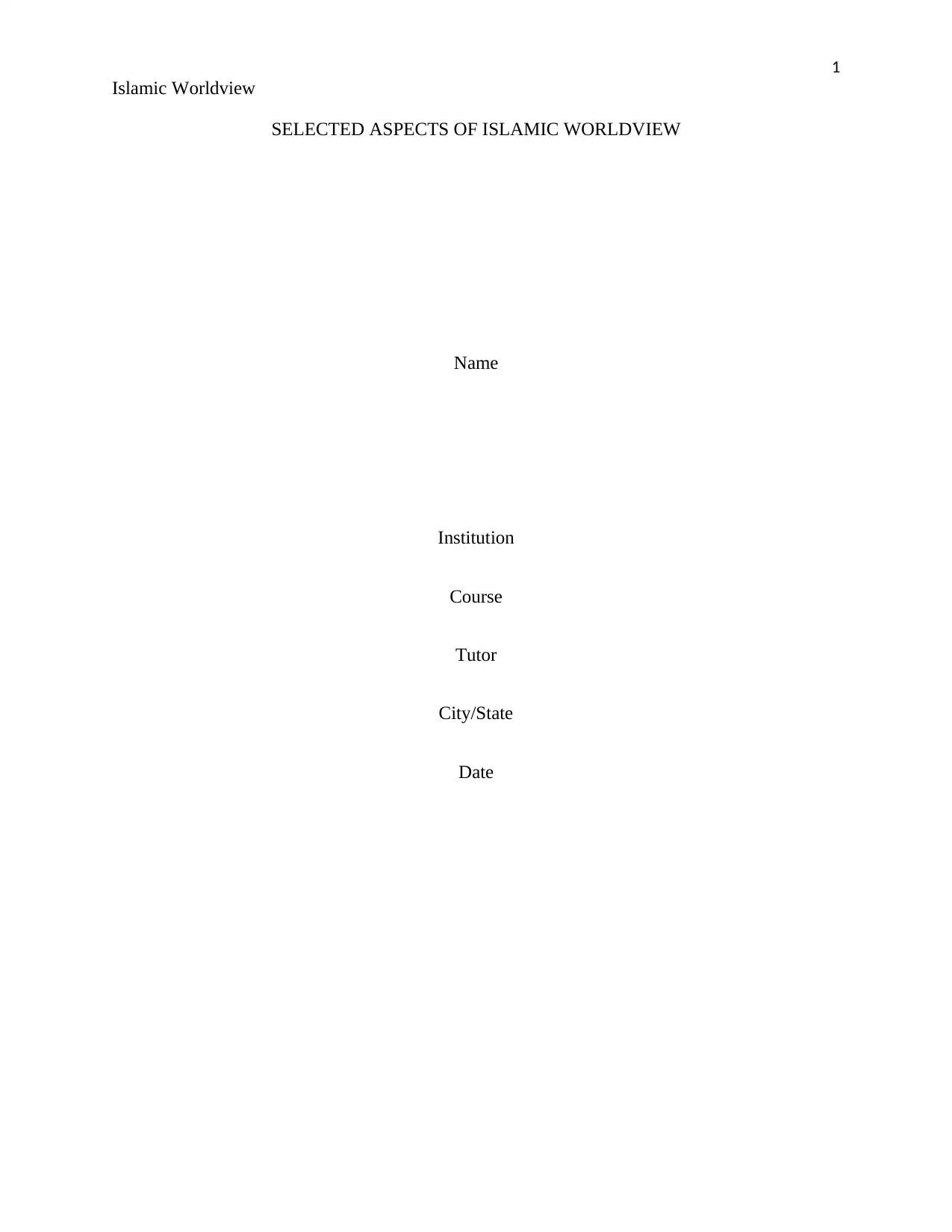
1
Islamic Worldview
SELECTED ASPECTS OF ISLAMIC WORLDVIEW
Name
Institution
Course
Tutor
City/State
Date
Islamic Worldview
SELECTED ASPECTS OF ISLAMIC WORLDVIEW
Name
Institution
Course
Tutor
City/State
Date
Paraphrase This Document
Need a fresh take? Get an instant paraphrase of this document with our AI Paraphraser
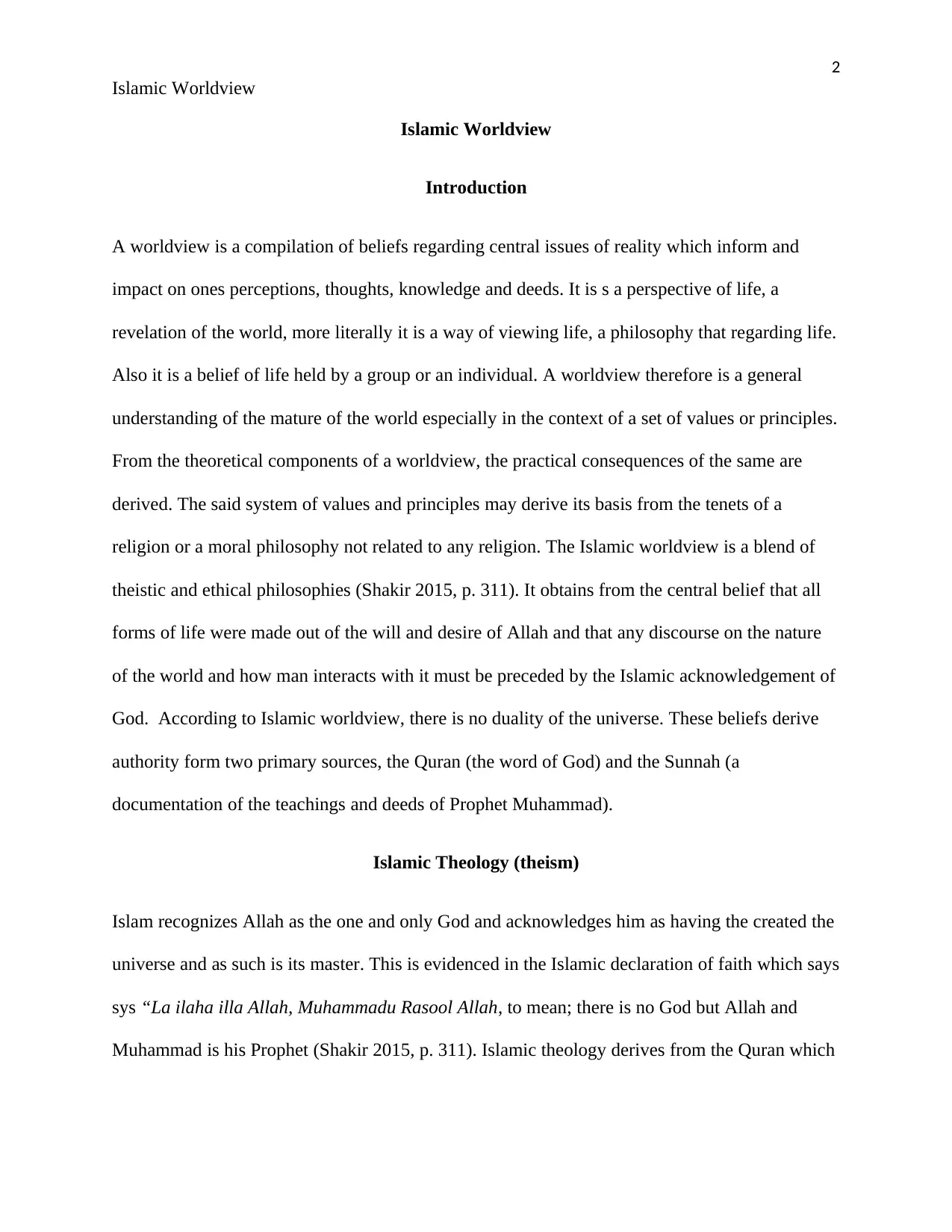
2
Islamic Worldview
Islamic Worldview
Introduction
A worldview is a compilation of beliefs regarding central issues of reality which inform and
impact on ones perceptions, thoughts, knowledge and deeds. It is s a perspective of life, a
revelation of the world, more literally it is a way of viewing life, a philosophy that regarding life.
Also it is a belief of life held by a group or an individual. A worldview therefore is a general
understanding of the mature of the world especially in the context of a set of values or principles.
From the theoretical components of a worldview, the practical consequences of the same are
derived. The said system of values and principles may derive its basis from the tenets of a
religion or a moral philosophy not related to any religion. The Islamic worldview is a blend of
theistic and ethical philosophies (Shakir 2015, p. 311). It obtains from the central belief that all
forms of life were made out of the will and desire of Allah and that any discourse on the nature
of the world and how man interacts with it must be preceded by the Islamic acknowledgement of
God. According to Islamic worldview, there is no duality of the universe. These beliefs derive
authority form two primary sources, the Quran (the word of God) and the Sunnah (a
documentation of the teachings and deeds of Prophet Muhammad).
Islamic Theology (theism)
Islam recognizes Allah as the one and only God and acknowledges him as having the created the
universe and as such is its master. This is evidenced in the Islamic declaration of faith which says
sys “La ilaha illa Allah, Muhammadu Rasool Allah, to mean; there is no God but Allah and
Muhammad is his Prophet (Shakir 2015, p. 311). Islamic theology derives from the Quran which
Islamic Worldview
Islamic Worldview
Introduction
A worldview is a compilation of beliefs regarding central issues of reality which inform and
impact on ones perceptions, thoughts, knowledge and deeds. It is s a perspective of life, a
revelation of the world, more literally it is a way of viewing life, a philosophy that regarding life.
Also it is a belief of life held by a group or an individual. A worldview therefore is a general
understanding of the mature of the world especially in the context of a set of values or principles.
From the theoretical components of a worldview, the practical consequences of the same are
derived. The said system of values and principles may derive its basis from the tenets of a
religion or a moral philosophy not related to any religion. The Islamic worldview is a blend of
theistic and ethical philosophies (Shakir 2015, p. 311). It obtains from the central belief that all
forms of life were made out of the will and desire of Allah and that any discourse on the nature
of the world and how man interacts with it must be preceded by the Islamic acknowledgement of
God. According to Islamic worldview, there is no duality of the universe. These beliefs derive
authority form two primary sources, the Quran (the word of God) and the Sunnah (a
documentation of the teachings and deeds of Prophet Muhammad).
Islamic Theology (theism)
Islam recognizes Allah as the one and only God and acknowledges him as having the created the
universe and as such is its master. This is evidenced in the Islamic declaration of faith which says
sys “La ilaha illa Allah, Muhammadu Rasool Allah, to mean; there is no God but Allah and
Muhammad is his Prophet (Shakir 2015, p. 311). Islamic theology derives from the Quran which
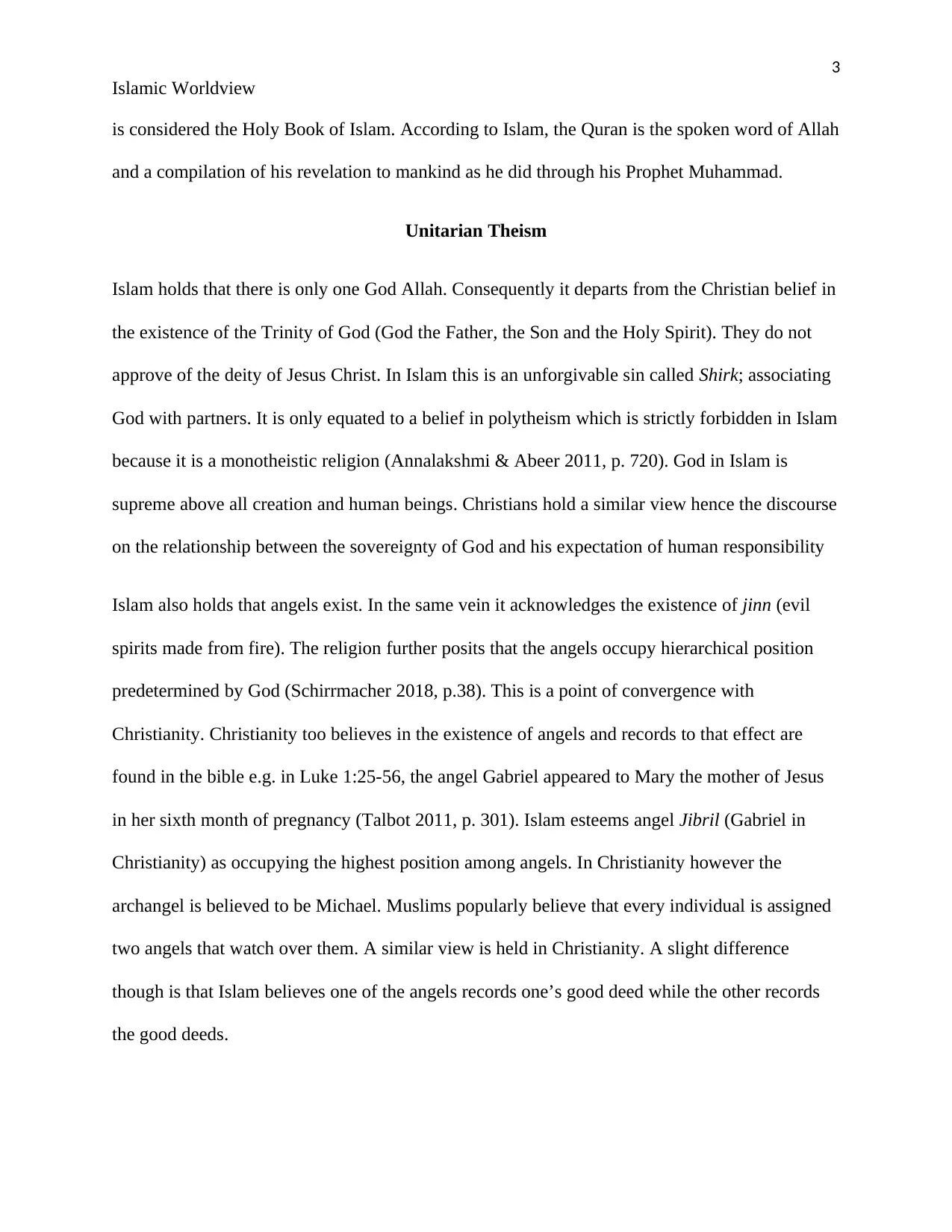
3
Islamic Worldview
is considered the Holy Book of Islam. According to Islam, the Quran is the spoken word of Allah
and a compilation of his revelation to mankind as he did through his Prophet Muhammad.
Unitarian Theism
Islam holds that there is only one God Allah. Consequently it departs from the Christian belief in
the existence of the Trinity of God (God the Father, the Son and the Holy Spirit). They do not
approve of the deity of Jesus Christ. In Islam this is an unforgivable sin called Shirk; associating
God with partners. It is only equated to a belief in polytheism which is strictly forbidden in Islam
because it is a monotheistic religion (Annalakshmi & Abeer 2011, p. 720). God in Islam is
supreme above all creation and human beings. Christians hold a similar view hence the discourse
on the relationship between the sovereignty of God and his expectation of human responsibility
Islam also holds that angels exist. In the same vein it acknowledges the existence of jinn (evil
spirits made from fire). The religion further posits that the angels occupy hierarchical position
predetermined by God (Schirrmacher 2018, p.38). This is a point of convergence with
Christianity. Christianity too believes in the existence of angels and records to that effect are
found in the bible e.g. in Luke 1:25-56, the angel Gabriel appeared to Mary the mother of Jesus
in her sixth month of pregnancy (Talbot 2011, p. 301). Islam esteems angel Jibril (Gabriel in
Christianity) as occupying the highest position among angels. In Christianity however the
archangel is believed to be Michael. Muslims popularly believe that every individual is assigned
two angels that watch over them. A similar view is held in Christianity. A slight difference
though is that Islam believes one of the angels records one’s good deed while the other records
the good deeds.
Islamic Worldview
is considered the Holy Book of Islam. According to Islam, the Quran is the spoken word of Allah
and a compilation of his revelation to mankind as he did through his Prophet Muhammad.
Unitarian Theism
Islam holds that there is only one God Allah. Consequently it departs from the Christian belief in
the existence of the Trinity of God (God the Father, the Son and the Holy Spirit). They do not
approve of the deity of Jesus Christ. In Islam this is an unforgivable sin called Shirk; associating
God with partners. It is only equated to a belief in polytheism which is strictly forbidden in Islam
because it is a monotheistic religion (Annalakshmi & Abeer 2011, p. 720). God in Islam is
supreme above all creation and human beings. Christians hold a similar view hence the discourse
on the relationship between the sovereignty of God and his expectation of human responsibility
Islam also holds that angels exist. In the same vein it acknowledges the existence of jinn (evil
spirits made from fire). The religion further posits that the angels occupy hierarchical position
predetermined by God (Schirrmacher 2018, p.38). This is a point of convergence with
Christianity. Christianity too believes in the existence of angels and records to that effect are
found in the bible e.g. in Luke 1:25-56, the angel Gabriel appeared to Mary the mother of Jesus
in her sixth month of pregnancy (Talbot 2011, p. 301). Islam esteems angel Jibril (Gabriel in
Christianity) as occupying the highest position among angels. In Christianity however the
archangel is believed to be Michael. Muslims popularly believe that every individual is assigned
two angels that watch over them. A similar view is held in Christianity. A slight difference
though is that Islam believes one of the angels records one’s good deed while the other records
the good deeds.
⊘ This is a preview!⊘
Do you want full access?
Subscribe today to unlock all pages.

Trusted by 1+ million students worldwide
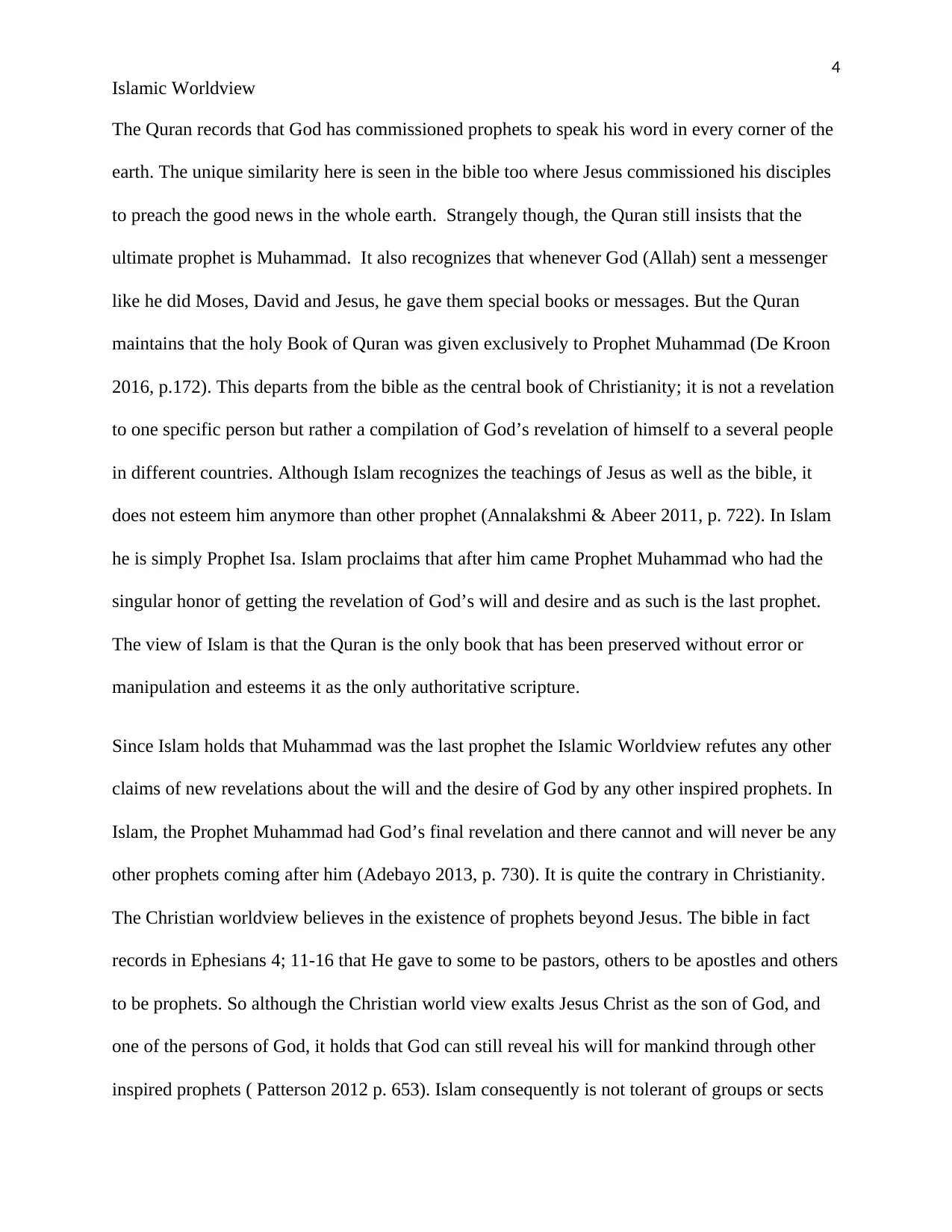
4
Islamic Worldview
The Quran records that God has commissioned prophets to speak his word in every corner of the
earth. The unique similarity here is seen in the bible too where Jesus commissioned his disciples
to preach the good news in the whole earth. Strangely though, the Quran still insists that the
ultimate prophet is Muhammad. It also recognizes that whenever God (Allah) sent a messenger
like he did Moses, David and Jesus, he gave them special books or messages. But the Quran
maintains that the holy Book of Quran was given exclusively to Prophet Muhammad (De Kroon
2016, p.172). This departs from the bible as the central book of Christianity; it is not a revelation
to one specific person but rather a compilation of God’s revelation of himself to a several people
in different countries. Although Islam recognizes the teachings of Jesus as well as the bible, it
does not esteem him anymore than other prophet (Annalakshmi & Abeer 2011, p. 722). In Islam
he is simply Prophet Isa. Islam proclaims that after him came Prophet Muhammad who had the
singular honor of getting the revelation of God’s will and desire and as such is the last prophet.
The view of Islam is that the Quran is the only book that has been preserved without error or
manipulation and esteems it as the only authoritative scripture.
Since Islam holds that Muhammad was the last prophet the Islamic Worldview refutes any other
claims of new revelations about the will and the desire of God by any other inspired prophets. In
Islam, the Prophet Muhammad had God’s final revelation and there cannot and will never be any
other prophets coming after him (Adebayo 2013, p. 730). It is quite the contrary in Christianity.
The Christian worldview believes in the existence of prophets beyond Jesus. The bible in fact
records in Ephesians 4; 11-16 that He gave to some to be pastors, others to be apostles and others
to be prophets. So although the Christian world view exalts Jesus Christ as the son of God, and
one of the persons of God, it holds that God can still reveal his will for mankind through other
inspired prophets ( Patterson 2012 p. 653). Islam consequently is not tolerant of groups or sects
Islamic Worldview
The Quran records that God has commissioned prophets to speak his word in every corner of the
earth. The unique similarity here is seen in the bible too where Jesus commissioned his disciples
to preach the good news in the whole earth. Strangely though, the Quran still insists that the
ultimate prophet is Muhammad. It also recognizes that whenever God (Allah) sent a messenger
like he did Moses, David and Jesus, he gave them special books or messages. But the Quran
maintains that the holy Book of Quran was given exclusively to Prophet Muhammad (De Kroon
2016, p.172). This departs from the bible as the central book of Christianity; it is not a revelation
to one specific person but rather a compilation of God’s revelation of himself to a several people
in different countries. Although Islam recognizes the teachings of Jesus as well as the bible, it
does not esteem him anymore than other prophet (Annalakshmi & Abeer 2011, p. 722). In Islam
he is simply Prophet Isa. Islam proclaims that after him came Prophet Muhammad who had the
singular honor of getting the revelation of God’s will and desire and as such is the last prophet.
The view of Islam is that the Quran is the only book that has been preserved without error or
manipulation and esteems it as the only authoritative scripture.
Since Islam holds that Muhammad was the last prophet the Islamic Worldview refutes any other
claims of new revelations about the will and the desire of God by any other inspired prophets. In
Islam, the Prophet Muhammad had God’s final revelation and there cannot and will never be any
other prophets coming after him (Adebayo 2013, p. 730). It is quite the contrary in Christianity.
The Christian worldview believes in the existence of prophets beyond Jesus. The bible in fact
records in Ephesians 4; 11-16 that He gave to some to be pastors, others to be apostles and others
to be prophets. So although the Christian world view exalts Jesus Christ as the son of God, and
one of the persons of God, it holds that God can still reveal his will for mankind through other
inspired prophets ( Patterson 2012 p. 653). Islam consequently is not tolerant of groups or sects
Paraphrase This Document
Need a fresh take? Get an instant paraphrase of this document with our AI Paraphraser
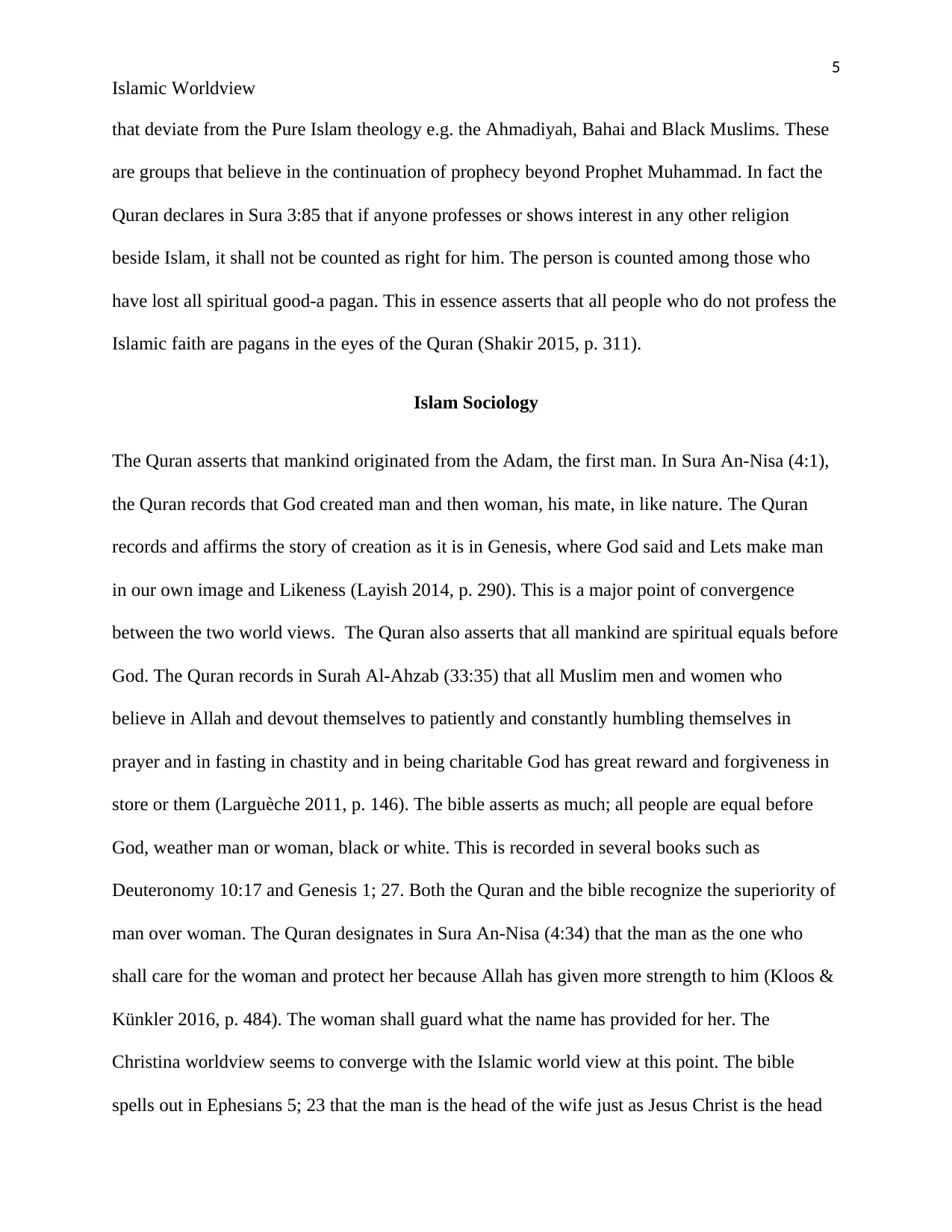
5
Islamic Worldview
that deviate from the Pure Islam theology e.g. the Ahmadiyah, Bahai and Black Muslims. These
are groups that believe in the continuation of prophecy beyond Prophet Muhammad. In fact the
Quran declares in Sura 3:85 that if anyone professes or shows interest in any other religion
beside Islam, it shall not be counted as right for him. The person is counted among those who
have lost all spiritual good-a pagan. This in essence asserts that all people who do not profess the
Islamic faith are pagans in the eyes of the Quran (Shakir 2015, p. 311).
Islam Sociology
The Quran asserts that mankind originated from the Adam, the first man. In Sura An-Nisa (4:1),
the Quran records that God created man and then woman, his mate, in like nature. The Quran
records and affirms the story of creation as it is in Genesis, where God said and Lets make man
in our own image and Likeness (Layish 2014, p. 290). This is a major point of convergence
between the two world views. The Quran also asserts that all mankind are spiritual equals before
God. The Quran records in Surah Al-Ahzab (33:35) that all Muslim men and women who
believe in Allah and devout themselves to patiently and constantly humbling themselves in
prayer and in fasting in chastity and in being charitable God has great reward and forgiveness in
store or them (Larguèche 2011, p. 146). The bible asserts as much; all people are equal before
God, weather man or woman, black or white. This is recorded in several books such as
Deuteronomy 10:17 and Genesis 1; 27. Both the Quran and the bible recognize the superiority of
man over woman. The Quran designates in Sura An-Nisa (4:34) that the man as the one who
shall care for the woman and protect her because Allah has given more strength to him (Kloos &
Künkler 2016, p. 484). The woman shall guard what the name has provided for her. The
Christina worldview seems to converge with the Islamic world view at this point. The bible
spells out in Ephesians 5; 23 that the man is the head of the wife just as Jesus Christ is the head
Islamic Worldview
that deviate from the Pure Islam theology e.g. the Ahmadiyah, Bahai and Black Muslims. These
are groups that believe in the continuation of prophecy beyond Prophet Muhammad. In fact the
Quran declares in Sura 3:85 that if anyone professes or shows interest in any other religion
beside Islam, it shall not be counted as right for him. The person is counted among those who
have lost all spiritual good-a pagan. This in essence asserts that all people who do not profess the
Islamic faith are pagans in the eyes of the Quran (Shakir 2015, p. 311).
Islam Sociology
The Quran asserts that mankind originated from the Adam, the first man. In Sura An-Nisa (4:1),
the Quran records that God created man and then woman, his mate, in like nature. The Quran
records and affirms the story of creation as it is in Genesis, where God said and Lets make man
in our own image and Likeness (Layish 2014, p. 290). This is a major point of convergence
between the two world views. The Quran also asserts that all mankind are spiritual equals before
God. The Quran records in Surah Al-Ahzab (33:35) that all Muslim men and women who
believe in Allah and devout themselves to patiently and constantly humbling themselves in
prayer and in fasting in chastity and in being charitable God has great reward and forgiveness in
store or them (Larguèche 2011, p. 146). The bible asserts as much; all people are equal before
God, weather man or woman, black or white. This is recorded in several books such as
Deuteronomy 10:17 and Genesis 1; 27. Both the Quran and the bible recognize the superiority of
man over woman. The Quran designates in Sura An-Nisa (4:34) that the man as the one who
shall care for the woman and protect her because Allah has given more strength to him (Kloos &
Künkler 2016, p. 484). The woman shall guard what the name has provided for her. The
Christina worldview seems to converge with the Islamic world view at this point. The bible
spells out in Ephesians 5; 23 that the man is the head of the wife just as Jesus Christ is the head
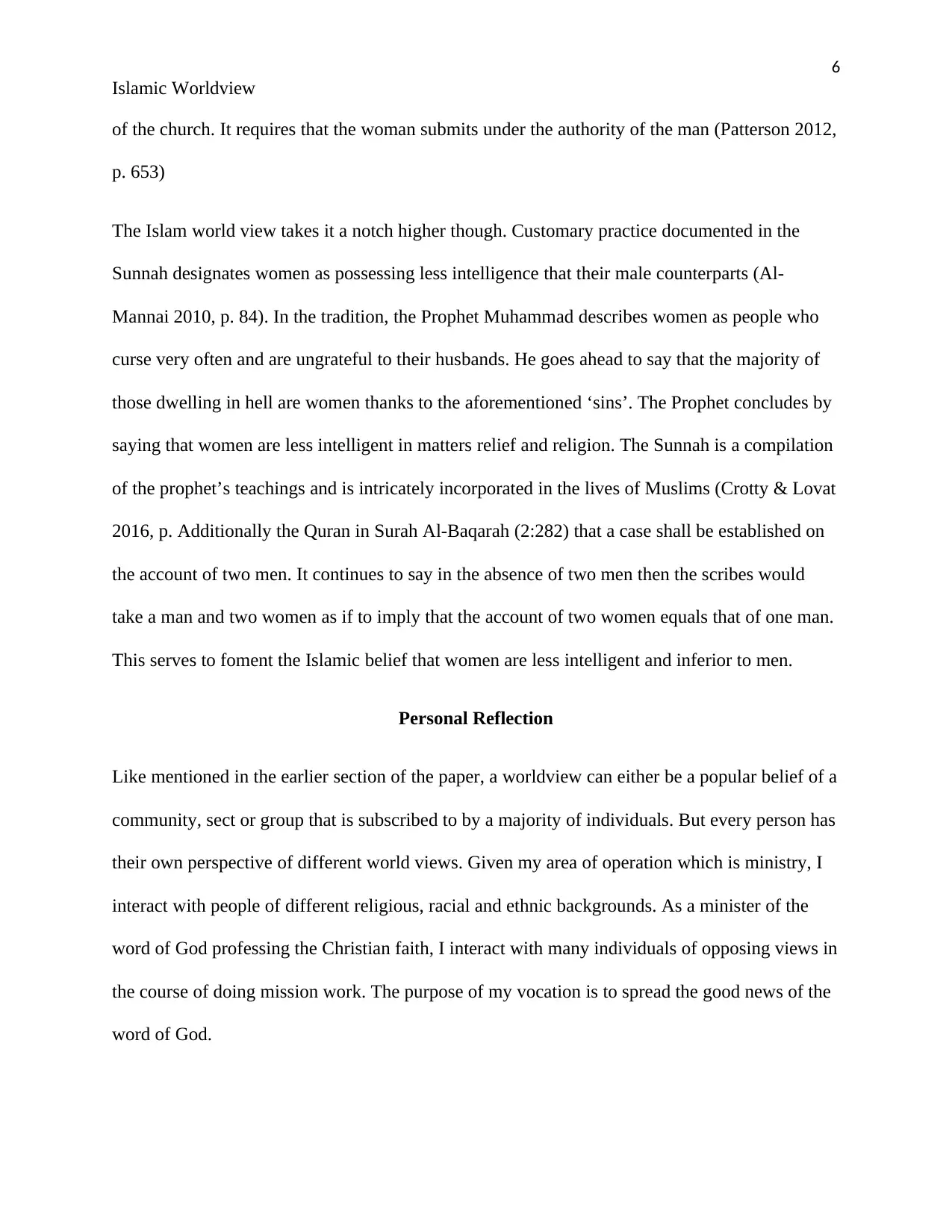
6
Islamic Worldview
of the church. It requires that the woman submits under the authority of the man (Patterson 2012,
p. 653)
The Islam world view takes it a notch higher though. Customary practice documented in the
Sunnah designates women as possessing less intelligence that their male counterparts (Al-
Mannai 2010, p. 84). In the tradition, the Prophet Muhammad describes women as people who
curse very often and are ungrateful to their husbands. He goes ahead to say that the majority of
those dwelling in hell are women thanks to the aforementioned ‘sins’. The Prophet concludes by
saying that women are less intelligent in matters relief and religion. The Sunnah is a compilation
of the prophet’s teachings and is intricately incorporated in the lives of Muslims (Crotty & Lovat
2016, p. Additionally the Quran in Surah Al-Baqarah (2:282) that a case shall be established on
the account of two men. It continues to say in the absence of two men then the scribes would
take a man and two women as if to imply that the account of two women equals that of one man.
This serves to foment the Islamic belief that women are less intelligent and inferior to men.
Personal Reflection
Like mentioned in the earlier section of the paper, a worldview can either be a popular belief of a
community, sect or group that is subscribed to by a majority of individuals. But every person has
their own perspective of different world views. Given my area of operation which is ministry, I
interact with people of different religious, racial and ethnic backgrounds. As a minister of the
word of God professing the Christian faith, I interact with many individuals of opposing views in
the course of doing mission work. The purpose of my vocation is to spread the good news of the
word of God.
Islamic Worldview
of the church. It requires that the woman submits under the authority of the man (Patterson 2012,
p. 653)
The Islam world view takes it a notch higher though. Customary practice documented in the
Sunnah designates women as possessing less intelligence that their male counterparts (Al-
Mannai 2010, p. 84). In the tradition, the Prophet Muhammad describes women as people who
curse very often and are ungrateful to their husbands. He goes ahead to say that the majority of
those dwelling in hell are women thanks to the aforementioned ‘sins’. The Prophet concludes by
saying that women are less intelligent in matters relief and religion. The Sunnah is a compilation
of the prophet’s teachings and is intricately incorporated in the lives of Muslims (Crotty & Lovat
2016, p. Additionally the Quran in Surah Al-Baqarah (2:282) that a case shall be established on
the account of two men. It continues to say in the absence of two men then the scribes would
take a man and two women as if to imply that the account of two women equals that of one man.
This serves to foment the Islamic belief that women are less intelligent and inferior to men.
Personal Reflection
Like mentioned in the earlier section of the paper, a worldview can either be a popular belief of a
community, sect or group that is subscribed to by a majority of individuals. But every person has
their own perspective of different world views. Given my area of operation which is ministry, I
interact with people of different religious, racial and ethnic backgrounds. As a minister of the
word of God professing the Christian faith, I interact with many individuals of opposing views in
the course of doing mission work. The purpose of my vocation is to spread the good news of the
word of God.
⊘ This is a preview!⊘
Do you want full access?
Subscribe today to unlock all pages.

Trusted by 1+ million students worldwide
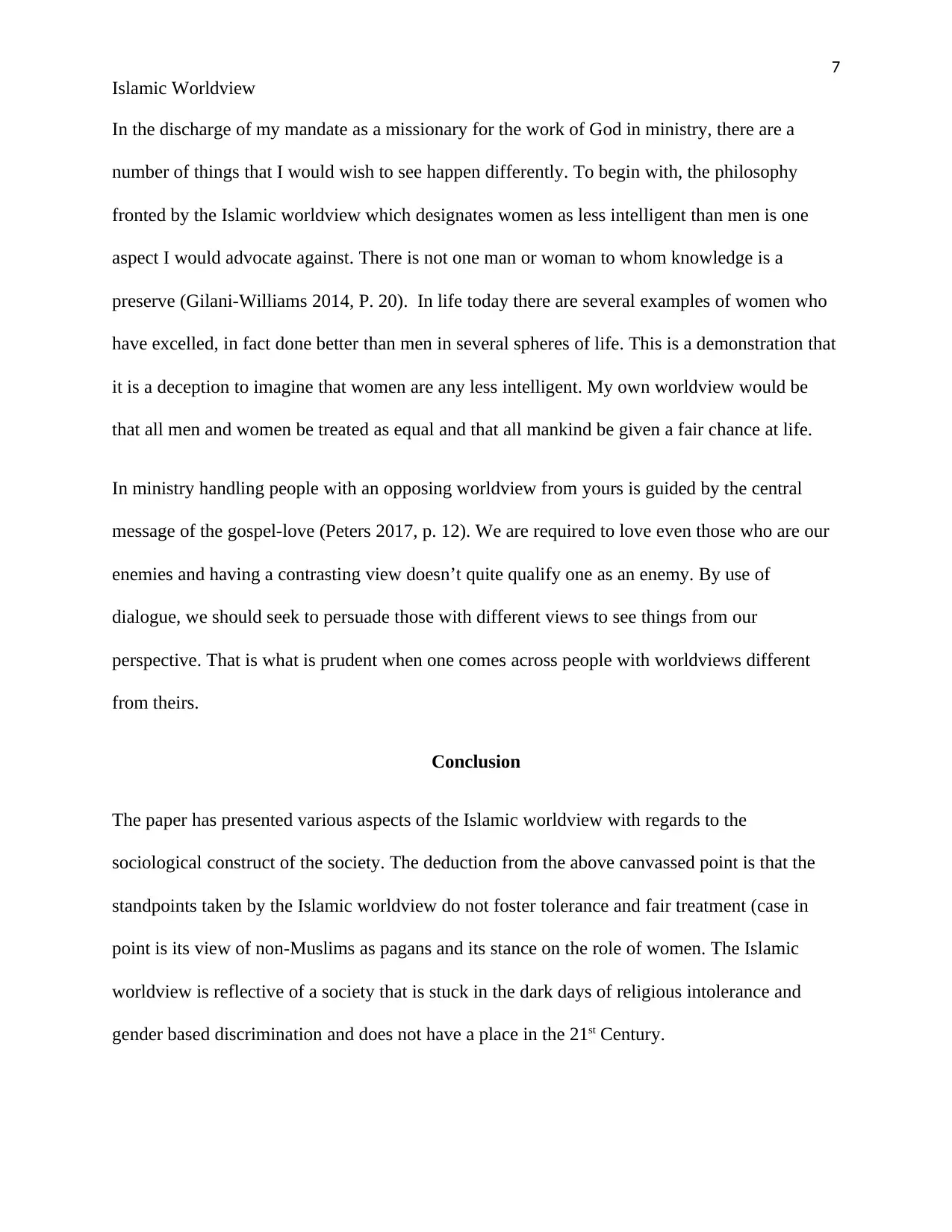
7
Islamic Worldview
In the discharge of my mandate as a missionary for the work of God in ministry, there are a
number of things that I would wish to see happen differently. To begin with, the philosophy
fronted by the Islamic worldview which designates women as less intelligent than men is one
aspect I would advocate against. There is not one man or woman to whom knowledge is a
preserve (Gilani-Williams 2014, P. 20). In life today there are several examples of women who
have excelled, in fact done better than men in several spheres of life. This is a demonstration that
it is a deception to imagine that women are any less intelligent. My own worldview would be
that all men and women be treated as equal and that all mankind be given a fair chance at life.
In ministry handling people with an opposing worldview from yours is guided by the central
message of the gospel-love (Peters 2017, p. 12). We are required to love even those who are our
enemies and having a contrasting view doesn’t quite qualify one as an enemy. By use of
dialogue, we should seek to persuade those with different views to see things from our
perspective. That is what is prudent when one comes across people with worldviews different
from theirs.
Conclusion
The paper has presented various aspects of the Islamic worldview with regards to the
sociological construct of the society. The deduction from the above canvassed point is that the
standpoints taken by the Islamic worldview do not foster tolerance and fair treatment (case in
point is its view of non-Muslims as pagans and its stance on the role of women. The Islamic
worldview is reflective of a society that is stuck in the dark days of religious intolerance and
gender based discrimination and does not have a place in the 21st Century.
Islamic Worldview
In the discharge of my mandate as a missionary for the work of God in ministry, there are a
number of things that I would wish to see happen differently. To begin with, the philosophy
fronted by the Islamic worldview which designates women as less intelligent than men is one
aspect I would advocate against. There is not one man or woman to whom knowledge is a
preserve (Gilani-Williams 2014, P. 20). In life today there are several examples of women who
have excelled, in fact done better than men in several spheres of life. This is a demonstration that
it is a deception to imagine that women are any less intelligent. My own worldview would be
that all men and women be treated as equal and that all mankind be given a fair chance at life.
In ministry handling people with an opposing worldview from yours is guided by the central
message of the gospel-love (Peters 2017, p. 12). We are required to love even those who are our
enemies and having a contrasting view doesn’t quite qualify one as an enemy. By use of
dialogue, we should seek to persuade those with different views to see things from our
perspective. That is what is prudent when one comes across people with worldviews different
from theirs.
Conclusion
The paper has presented various aspects of the Islamic worldview with regards to the
sociological construct of the society. The deduction from the above canvassed point is that the
standpoints taken by the Islamic worldview do not foster tolerance and fair treatment (case in
point is its view of non-Muslims as pagans and its stance on the role of women. The Islamic
worldview is reflective of a society that is stuck in the dark days of religious intolerance and
gender based discrimination and does not have a place in the 21st Century.
Paraphrase This Document
Need a fresh take? Get an instant paraphrase of this document with our AI Paraphraser
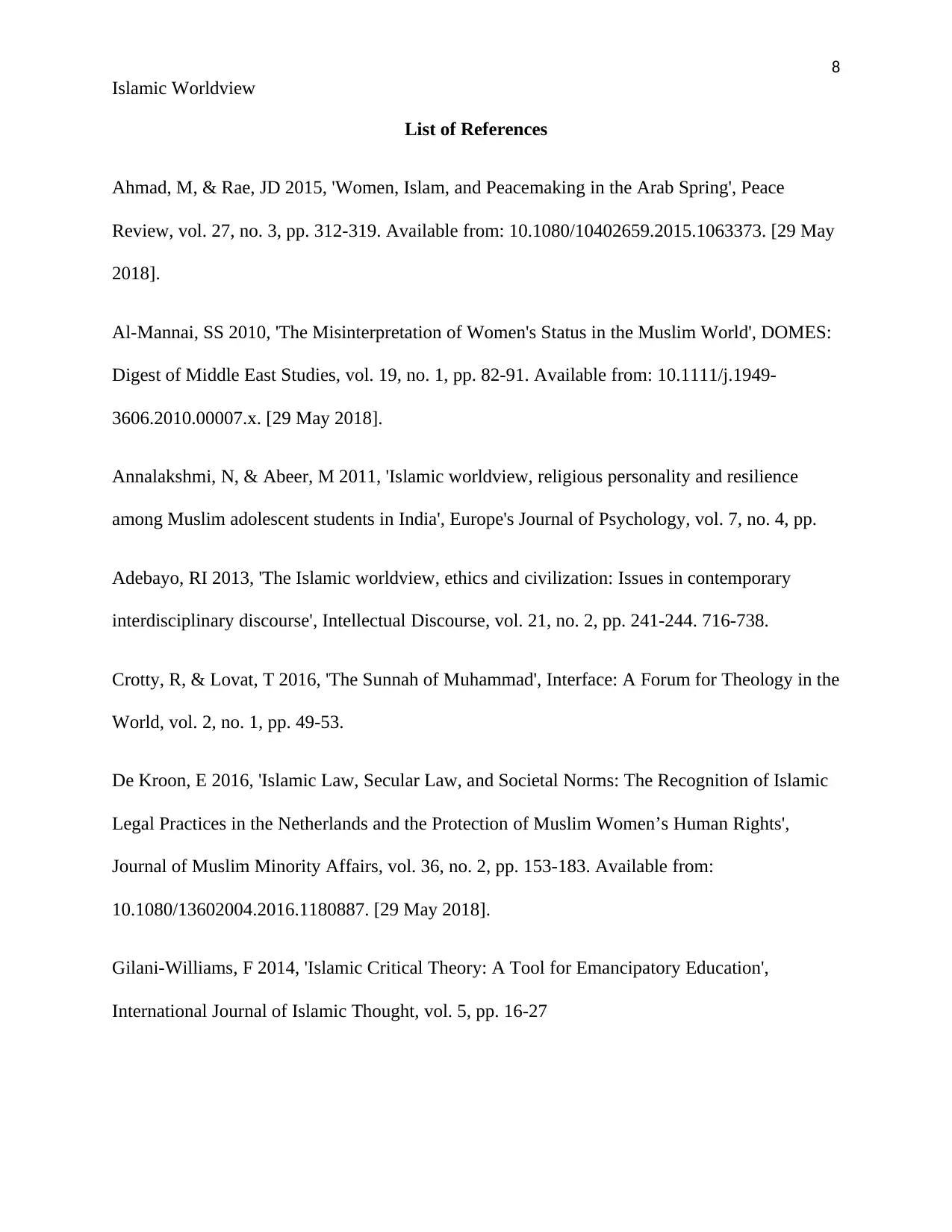
8
Islamic Worldview
List of References
Ahmad, M, & Rae, JD 2015, 'Women, Islam, and Peacemaking in the Arab Spring', Peace
Review, vol. 27, no. 3, pp. 312-319. Available from: 10.1080/10402659.2015.1063373. [29 May
2018].
Al-Mannai, SS 2010, 'The Misinterpretation of Women's Status in the Muslim World', DOMES:
Digest of Middle East Studies, vol. 19, no. 1, pp. 82-91. Available from: 10.1111/j.1949-
3606.2010.00007.x. [29 May 2018].
Annalakshmi, N, & Abeer, M 2011, 'Islamic worldview, religious personality and resilience
among Muslim adolescent students in India', Europe's Journal of Psychology, vol. 7, no. 4, pp.
Adebayo, RI 2013, 'The Islamic worldview, ethics and civilization: Issues in contemporary
interdisciplinary discourse', Intellectual Discourse, vol. 21, no. 2, pp. 241-244. 716-738.
Crotty, R, & Lovat, T 2016, 'The Sunnah of Muhammad', Interface: A Forum for Theology in the
World, vol. 2, no. 1, pp. 49-53.
De Kroon, E 2016, 'Islamic Law, Secular Law, and Societal Norms: The Recognition of Islamic
Legal Practices in the Netherlands and the Protection of Muslim Women’s Human Rights',
Journal of Muslim Minority Affairs, vol. 36, no. 2, pp. 153-183. Available from:
10.1080/13602004.2016.1180887. [29 May 2018].
Gilani-Williams, F 2014, 'Islamic Critical Theory: A Tool for Emancipatory Education',
International Journal of Islamic Thought, vol. 5, pp. 16-27
Islamic Worldview
List of References
Ahmad, M, & Rae, JD 2015, 'Women, Islam, and Peacemaking in the Arab Spring', Peace
Review, vol. 27, no. 3, pp. 312-319. Available from: 10.1080/10402659.2015.1063373. [29 May
2018].
Al-Mannai, SS 2010, 'The Misinterpretation of Women's Status in the Muslim World', DOMES:
Digest of Middle East Studies, vol. 19, no. 1, pp. 82-91. Available from: 10.1111/j.1949-
3606.2010.00007.x. [29 May 2018].
Annalakshmi, N, & Abeer, M 2011, 'Islamic worldview, religious personality and resilience
among Muslim adolescent students in India', Europe's Journal of Psychology, vol. 7, no. 4, pp.
Adebayo, RI 2013, 'The Islamic worldview, ethics and civilization: Issues in contemporary
interdisciplinary discourse', Intellectual Discourse, vol. 21, no. 2, pp. 241-244. 716-738.
Crotty, R, & Lovat, T 2016, 'The Sunnah of Muhammad', Interface: A Forum for Theology in the
World, vol. 2, no. 1, pp. 49-53.
De Kroon, E 2016, 'Islamic Law, Secular Law, and Societal Norms: The Recognition of Islamic
Legal Practices in the Netherlands and the Protection of Muslim Women’s Human Rights',
Journal of Muslim Minority Affairs, vol. 36, no. 2, pp. 153-183. Available from:
10.1080/13602004.2016.1180887. [29 May 2018].
Gilani-Williams, F 2014, 'Islamic Critical Theory: A Tool for Emancipatory Education',
International Journal of Islamic Thought, vol. 5, pp. 16-27
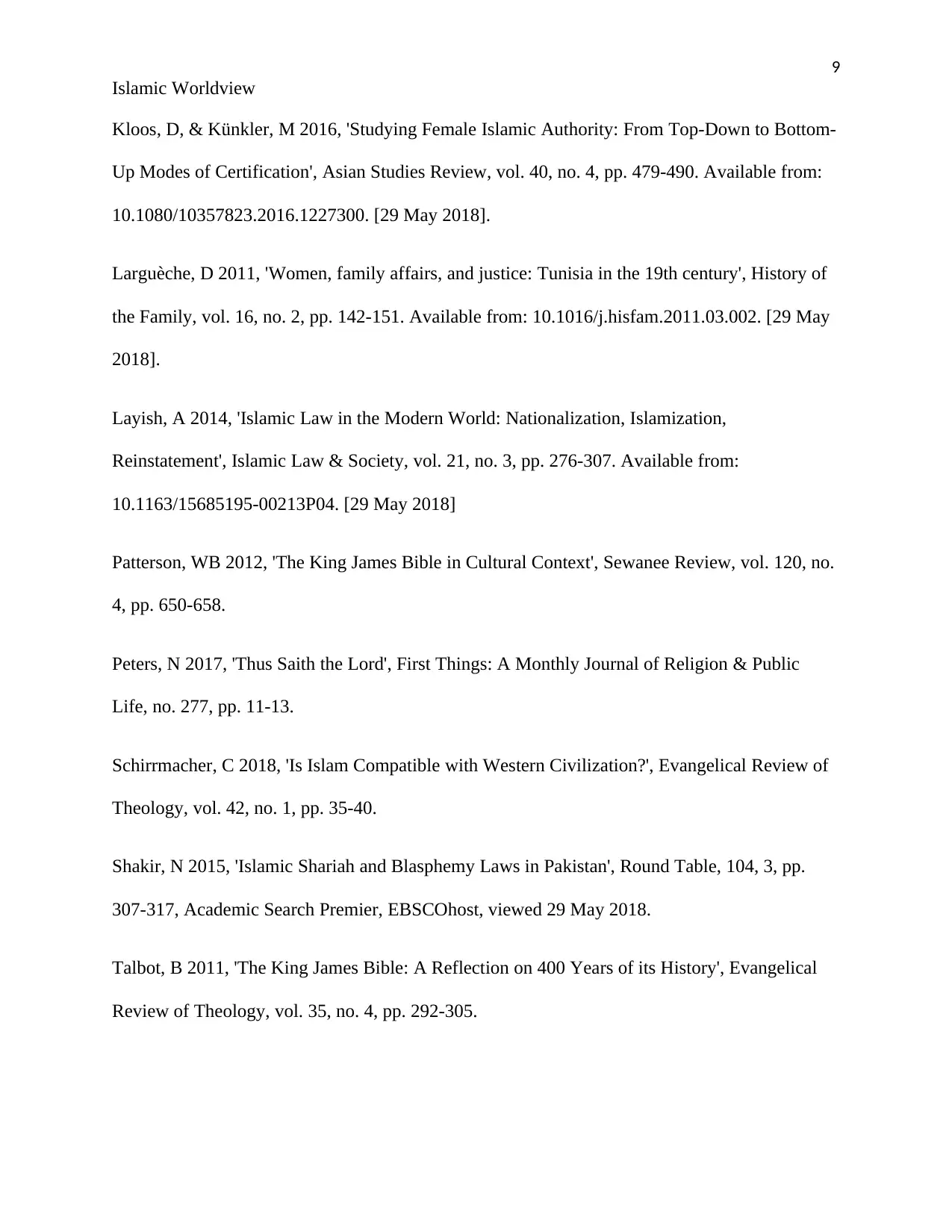
9
Islamic Worldview
Kloos, D, & Künkler, M 2016, 'Studying Female Islamic Authority: From Top-Down to Bottom-
Up Modes of Certification', Asian Studies Review, vol. 40, no. 4, pp. 479-490. Available from:
10.1080/10357823.2016.1227300. [29 May 2018].
Larguèche, D 2011, 'Women, family affairs, and justice: Tunisia in the 19th century', History of
the Family, vol. 16, no. 2, pp. 142-151. Available from: 10.1016/j.hisfam.2011.03.002. [29 May
2018].
Layish, A 2014, 'Islamic Law in the Modern World: Nationalization, Islamization,
Reinstatement', Islamic Law & Society, vol. 21, no. 3, pp. 276-307. Available from:
10.1163/15685195-00213P04. [29 May 2018]
Patterson, WB 2012, 'The King James Bible in Cultural Context', Sewanee Review, vol. 120, no.
4, pp. 650-658.
Peters, N 2017, 'Thus Saith the Lord', First Things: A Monthly Journal of Religion & Public
Life, no. 277, pp. 11-13.
Schirrmacher, C 2018, 'Is Islam Compatible with Western Civilization?', Evangelical Review of
Theology, vol. 42, no. 1, pp. 35-40.
Shakir, N 2015, 'Islamic Shariah and Blasphemy Laws in Pakistan', Round Table, 104, 3, pp.
307-317, Academic Search Premier, EBSCOhost, viewed 29 May 2018.
Talbot, B 2011, 'The King James Bible: A Reflection on 400 Years of its History', Evangelical
Review of Theology, vol. 35, no. 4, pp. 292-305.
Islamic Worldview
Kloos, D, & Künkler, M 2016, 'Studying Female Islamic Authority: From Top-Down to Bottom-
Up Modes of Certification', Asian Studies Review, vol. 40, no. 4, pp. 479-490. Available from:
10.1080/10357823.2016.1227300. [29 May 2018].
Larguèche, D 2011, 'Women, family affairs, and justice: Tunisia in the 19th century', History of
the Family, vol. 16, no. 2, pp. 142-151. Available from: 10.1016/j.hisfam.2011.03.002. [29 May
2018].
Layish, A 2014, 'Islamic Law in the Modern World: Nationalization, Islamization,
Reinstatement', Islamic Law & Society, vol. 21, no. 3, pp. 276-307. Available from:
10.1163/15685195-00213P04. [29 May 2018]
Patterson, WB 2012, 'The King James Bible in Cultural Context', Sewanee Review, vol. 120, no.
4, pp. 650-658.
Peters, N 2017, 'Thus Saith the Lord', First Things: A Monthly Journal of Religion & Public
Life, no. 277, pp. 11-13.
Schirrmacher, C 2018, 'Is Islam Compatible with Western Civilization?', Evangelical Review of
Theology, vol. 42, no. 1, pp. 35-40.
Shakir, N 2015, 'Islamic Shariah and Blasphemy Laws in Pakistan', Round Table, 104, 3, pp.
307-317, Academic Search Premier, EBSCOhost, viewed 29 May 2018.
Talbot, B 2011, 'The King James Bible: A Reflection on 400 Years of its History', Evangelical
Review of Theology, vol. 35, no. 4, pp. 292-305.
⊘ This is a preview!⊘
Do you want full access?
Subscribe today to unlock all pages.

Trusted by 1+ million students worldwide

10
Islamic Worldview
Islamic Worldview
1 out of 10
Your All-in-One AI-Powered Toolkit for Academic Success.
+13062052269
info@desklib.com
Available 24*7 on WhatsApp / Email
![[object Object]](/_next/static/media/star-bottom.7253800d.svg)
Unlock your academic potential
Copyright © 2020–2026 A2Z Services. All Rights Reserved. Developed and managed by ZUCOL.

